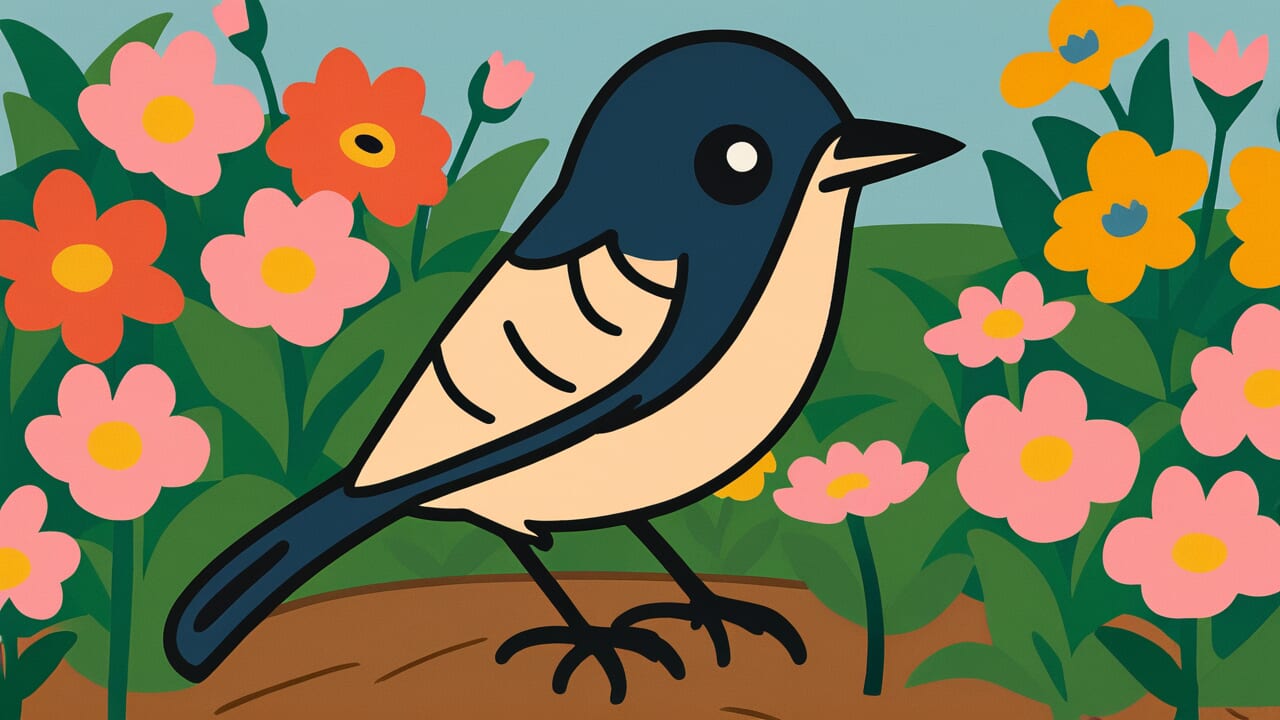How to Read “The nightingale’s tongue among flowers is not a flower, yet it is fragrant”
Kachū no uguisu shita wa hana narazu shite kōbashi
Meaning of “The nightingale’s tongue among flowers is not a flower, yet it is fragrant”
This proverb means that words from someone in a beautiful environment hold even more beauty and value than the environment itself.
Just as the nightingale’s voice among flowers is more fragrant than the flowers themselves, words and ideas from someone nurtured in an excellent environment carry value beyond that environment.
People use this saying when someone educated in a good environment makes an outstanding statement. It also applies when a student trained under an excellent teacher shows remarkable results.
The proverb celebrates not just having a good environment, but absorbing it and transforming it into something uniquely your own.
Today, we understand this proverb as showing both the importance of educational environment and the person’s attitude toward learning. The environment provides the foundation, but the words and actions born from it hold the true value.
Origin and Etymology
Multiple theories exist about the exact origin of this proverb. The most likely explanation traces it to Chinese classical literature or Zen writings, though no specific text has been definitively identified.
The phrase “nightingale among flowers” creates a striking image. The nightingale singing beautifully among flowers has symbolized the arrival of spring in both Japan and China since ancient times.
In this beautiful environment surrounded by flowers, the bird’s “tongue”—meaning its words or voice—is more fragrant than the flowers themselves.
The word “fragrant” deserves special attention. It doesn’t simply mean “good.” It suggests a high-quality aroma, dignity, and beauty that touches people’s hearts.
The proverb contrasts the visual beauty of flowers with the auditory beauty of the nightingale’s voice, yet describes both using “fragrant,” a word related to smell. This layering of senses gives the proverb its deep richness.
This saying likely emerged in contexts discussing human development and education. A beautiful environment nurtures people, but the words spoken by those raised in that environment become the most beautiful flowers of all.
Usage Examples
- She not only studied at a prestigious school, but her proposal utilizing that experience was truly “The nightingale’s tongue among flowers is not a flower, yet it is fragrant”
- The young researcher’s paper, written after training under that professor, perfectly embodies “The nightingale’s tongue among flowers is not a flower, yet it is fragrant,” shining even brighter than the teacher
Universal Wisdom
This proverb offers deep insight into the relationship between environment and human growth. It carries a hopeful message: people are shaped by their environment, but ultimately they transcend it.
Why has this saying been passed down through generations? It expresses the belief that humans can learn from their environment, digest it in their own way, and create something even more beautiful.
Flowers are beautiful, but the nightingale raised among them transforms what it sees and feels into song, creating new value. This captures the essence of human creativity.
The proverb also reveals the true nature of education. Providing a good environment matters, but what matters more is what you learn there and how you grow.
Not every nightingale among flowers sings beautifully. Whether you can make use of your environment depends on your own sensitivity and effort.
Humans are not passive beings. They learn from their environment and transcend it. This recognition is why this proverb resonates across time.
Rather than environmental determinism, this saying expresses faith in human potential.
When AI Hears This
In information theory, we measure the ratio between valuable information (signal) and irrelevant information (noise) as the signal-to-noise ratio. This proverb describes a situation with an extremely low signal-to-noise ratio.
Flowers, as visually overwhelming noise sources, dominate the space. The nightingale’s tongue represents a tiny signal. Can you detect it? This is a cognitive challenge.
What’s interesting is that the flower noise is “beautiful.” Usually noise is just annoying, but here it actively attracts attention. Human brains evolved to prioritize large, vivid things.
Flowers biologically “hijack attention.” To discover the nightingale’s tongue in this environment, you must intentionally suppress visual-dominant processing and switch to another channel—taste or essential value.
This applies to today’s internet environment. Flashy ads and videos (flowers) fill the screen. Can you find the truly valuable single line of text (nightingale’s tongue)?
In our information-overloaded age, this proverb suggests the importance of “noise-resistant information detection ability.” True information literacy might be the courage to ignore what stands out.
Lessons for Today
This proverb teaches us to appreciate our environment while not becoming complacent. Your current environment—where you study, where you work—is the soil that nurtures you.
But what truly matters is what you absorb there and how you transform it into your own words and actions.
Modern society often emphasizes academic credentials and organizational brand names. But this proverb asks us: Did you really learn in that environment? Can you digest it and create new value?
Graduating from a prestigious school or working at a famous company means nothing if you learn nothing there.
Conversely, whatever environment you’re in, if you sincerely learn from it, you can create value that transcends that environment.
Like the nightingale that was moved by the flowers’ beauty and transformed it into its own song, you can transform what you learn into your unique words and actions.
Your environment is just the starting point. Where you fly from there is up to you.



Comments